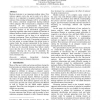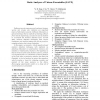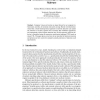111
click to vote
ICC
2009
IEEE
14 years 11 months ago
2009
IEEE
Smartphones are getting increasingly popular and several malwares appeared targeting these devices. General countermeasures to smartphone malwares are currently limited to signatur...
104
click to vote
RAID
2010
Springer
15 years 14 days ago
2010
Springer
Abstract. Run-time malware detection strategies are efficient and robust, which get more and more attention. In this paper, we use I/O Request Package (IRP) sequences for malware d...
134
click to vote
CMS
2010
15 years 2 months ago
2010
While conventional malware detection approaches increasingly fail, modern heuristic strategies often perform dynamically, which is not possible in many applications due to related ...
152
click to vote
AUSDM
2008
Springer
15 years 4 months ago
2008
Springer
Malware detection is an important problem today. New malware appears every day and in order to be able to detect it, it is important to recognize families of existing malware. Dat...
131
click to vote
ACSAC
2004
IEEE
15 years 5 months ago
2004
IEEE
Software security assurance and malware (trojans, worms, and viruses, etc.) detection are important topics of information security. Software obfuscation, a general technique that ...
115
click to vote
EUROCAST
2007
Springer
15 years 6 months ago
2007
Springer
Abstract. Computer viruses and worms are major threats for our computer infrastructure, and thus, for economy and society at large. Recent work has demonstrated that a model checki...
139
click to vote
SP
2005
IEEE
15 years 7 months ago
2005
IEEE
A malware detector is a system that attempts to determine whether a program has malicious intent. In order to evade detection, malware writers (hackers) frequently use obfuscation...
125
click to vote
CCS
2007
ACM
15 years 8 months ago
2007
ACM
An alarming trend in malware attacks is that they are armed with stealthy techniques to detect, evade, and subvert malware detection facilities of the victim. On the defensive sid...
119
click to vote
RAID
2009
Springer
15 years 8 months ago
2009
Springer
Due to the rapid advancement of mobile communication technology, mobile devices nowadays can support a variety of data services that are not traditionally available. With the growi...
120
click to vote
ISW
2009
Springer
15 years 8 months ago
2009
Springer
Abstract. The complexity of modern network architectures and the epidemic diffusion of malware require collaborative approaches for defense. We present a novel distributed system ...



